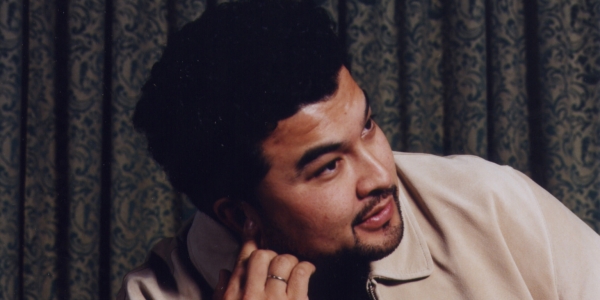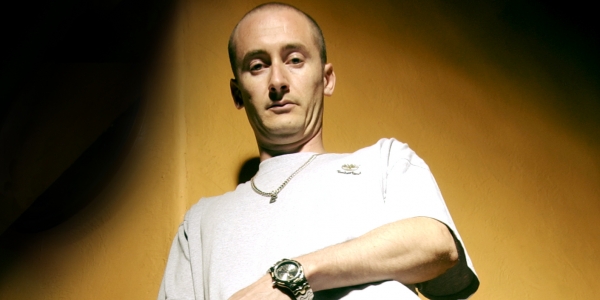“I think when I first started what I really cared about was advancing. One of the things that I really cared about was taking hip hop in new directions, you know, and I think now at this stage in my career, I care more about just making music in directions.” Tsutomu Shimura aka Lyrics Born has constantly shown innovation and progression within his revered career, and his latest release As U Were not only one that warrants your attention, but demands it. As one half of nineties duo Latryx, Shimura demonstrated his ability to take a sound a redefine it with panache, but while his early solo outings furthered the ground he had gained, As U Were shows an eclectic Shimura shimmering in a whole new light. Of the change, the modest musician says, “I don’t look at the music as being so hip hop specific anymore in terms of progression.”
While we are all constantly undergoing changes, on a professional level within the music industry, changing direction can often be career damaging as opposed to enhancing. However, it soon becomes clear, that although Shimura acknowledges a conscious change of direction, he feels that as an artist it is inevitable as opposed to extraordinary. He states, “I think as I grew and as I expanded my repertoire, and as I became more exposed to things as an artist, I think I changed. My tastes broadened and I was just exposed to more. That is what’s brought me to place I am at now, to want to explore new directions and incorporate it into my music.”
“I definitely wanted to hit refresh on my browser and go in a different direction. It really paid homage to a sound that was really influential to me. I had kind paid lip service and dabbled with it in the past, but never pursued it wholeheartedly. I just decided I was going to take that approach on this album.” With the desire to taste the untested and push his own musical boundaries, did he find that he was suddenly seeking new musical inspirations? Or was it a case of pressing rewind and revisiting sounds he had once loved? The answer is one of conscious recall. Having clearly always been a keen music fan, his mental back catalogue is immense and so he tuned in to his head to see what sounds he wanted to explore. He reveals, “When I was doing this album I was inspired by everything from David Bowie to Grace Jones to early 80s dance music to Depeche Mode to INXS or Michael Jackson and Teena Marie, Rick James. There was just so much going on, but it was generally from that time period.”
By admitting that he had taken time to tune into some of his musical icons, was he ever afraid that his inspirations would accidentally veer on the obvious and apparent? “Sure”, comes the initial concise, clear response, before a slight change of tack, “I would think, again I listen to a lot of different music, a lot of different styles and genres and I think, there are certain things that other artists are doing that I don’t do. Artists in general are impressionable people on the one hand, but on the other hand we are also very stubborn. So, I think that, if I am inspired by something a certain artist is doing, I will reinterpret it in my own way.” Clearly worried that his initial gut reaction inferred he was in some way, shape or form a copycat, Shimura wanted to clarify that he was anything but, however, to really drive the point home, he states adamantly, “I am not just going to rip them off, but I am able to reinterpret it in my own way.”
With the inspired change of direction cleared up, Shimura barely needs a beat to contemplate his favourite tracks on the record. Without hesitation he offers up, “I would say it would probably be between two songs. It would be between Pushed Aside, Pulled Apart and Shoulda Coulda Woulda. I think those two songs spell out the album.” While his answers intimates a level of achievement within the two tracks, when asked to clarify his reasons, the sense of accomplishment matches his overall opinion, “I think just sonically, in terms of the sound palette, they represent what the album sounds like. I also think topically, subject matter wise, they kind of cover a lot of emotional ground that I was going through whilst I was writing the album.”
With both of his selected tracks highlighting the fact Shimura is a king of collaboration (the tracks featured Lateef and Sam Sparro respectively), with his latest efforts easily superseding the recent Snoog Dogg explorations, it seemed only appropriate to get to root of his duo dynamic. When questioned about whom he could see himself working with, he initially laughs, “There are hundreds”, before proceeding to list an entire musical who’s who that includes, “Everybody from the Black Keys to the Decemberists to Arcade Fire to Kanye West to A-Trak to Jay-Z to Trey Songz.” While the list continues, it is clear that Shimura is a man who dislikes restriction. With As U Were proof of the case at hand, he is not someone who still believes that music is about boundaries and labels. Once again he asserts, “My taste is really all over the map. I just really love good music,” before heading into a detailed, but favorable analysis of the state of the current music industry, which can easily be summarized by his affirmation, “I am fortunate that I grew up in a time and an environment where we didn’t limit ourselves in music or art in general.”
Rather than describing his eclectic attitude towards to the arts as somewhat exclusive, he feels that he is merely a product of his generation. He is far from alone in wanting to be challenged without borders. He confirms his joy at the situation with by revealing, “I never really looked at music from the standpoint of ‘I should be into this’ or ‘this is not cool’, I never really looked at it like that. I see now how that has really benefited me as an artist.”
While his open mind may explain, to a degree, his willingness to collaborate, how does he decide which tracks need that little bit of external loving and which ones are perfectly fine as they stand? Is it all about tending to the needs of the music, or is it more a case of forethought and pre-planning? Without a second thought, he reveals, “It is a little bit of both,” before explaining, “Sometimes I really feel like I am hearing a vocalist on a song that I just can’t pull off. I am hearing a vocalist and that vocalist is not me, do you know what I mean?” Having written and recorded a track, sometimes there is a missing ingredient and so instead of allowing ego determine his need to dominate a track, he seeks a solution. “I will try to find that vocalist. I will search my mental file and ask ‘who can I plug in here?'” However, as is no doubt apparent from his earlier extended list, Shimura is a man who admires the talents, so what of writing with someone in mind? Taking a moment to contemplate, his responds, “I may respect an artist and I may say, ‘I bet if we collaborated on a song, then we could come up with something really special here.'”
Clearly open to any eventuality and opportunity, Shimura asserts, “I am very, very strong believer in collaboration, as I just feel like, you never get to know your own limitations unless you work with other people. I just don’t believe in, at least for myself, I don’t work well by myself, I don’t believe in working in a bubble. I have to be around other creative people in order to get the most out of myself.” In much the same way he seeks musical inspiration from other artists, Shimura believes that by drawing on the experiences and opinions of your peers, your musical horizons can be diversified and widened. While many may not admit to being such sponges, he points that “Most creative people think that way. I think most creative people draw inspiration from other creative people, whether directly or indirectly. It is just sort of a part of it all.”

